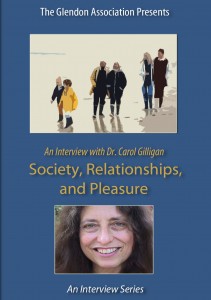Why Women Find it Diffiicult to Attach to Pleasure
Lisa Firestone: It’s also been my experience when people really feel the most joy or the most loving or close moments that it also brings up, it brings up more anxiety about death and loss—
Carol Gilligan: It’s perfect. If I enjoy, like, how will I deal with death. But if I’m not enjoying, like, I might as well be dead right now. I remember when I was doing workshops with women with Kristin Linklater in what was called “Company of Women” and we did these, you know, “In our own Voices” workshops with women and it was so interesting, the hardest place for women to go was joy. It was so much easier to go into sadness and pain or anger or, but to go into joy, it was like to be in the place that… you know, you would see a woman remembering.
I remember this woman who came into the workshop and she was so kind of depressed, and she looked that way. And we were doing all this around going back to when you were nine, ten or eleven or remembering things and she got in touch with a memory of when she was in probably fourth or fifth grade and they were doing South Pacific and she was, she played the Mary Martin role and she remembered singing, I’m Going To Wash That Man Right Out Of My Hair. And I remember Kristen said to her, “Sing it,” and she did and her face just opened, and we saw a person you wouldn’t have imagined when she walked into the workshop.
And she [the woman] got really angry because to take her to that place was to challenge an adaptation which had sort of settled into this anger and depression and everything else. So, I mean, a series of these kinds of observations that led me to write that book [Birth of Pleasure] because in a way on the face of it, it doesn’t make sense.
Order the Full DVD Interview:
 Society, Relationships and Pleasure
Society, Relationships and Pleasure
In this DVD, Dr. Carol Gilligan addresses a variety of topics including feminism, patriarchy, relationships, pleasure, parenting, and psychotherapy. She dispels myths regarding feminism that have pervaded both professional discourse and popular media for the past three decades, describing how “patriarchy creates a rift in the psyche, dividing everyone apart from themselves.” She discusses relationships and parenting, including the dynamics of mother-son and mother-daughter relationships. Finally, Dr. Gilligan addresses the dilemma of pleasure, stating that “pleasure is act one in a play that ends badly.” Emphasizing its importance, she describes how people often defend against pain by not feeling pleasure.










Leave a Reply